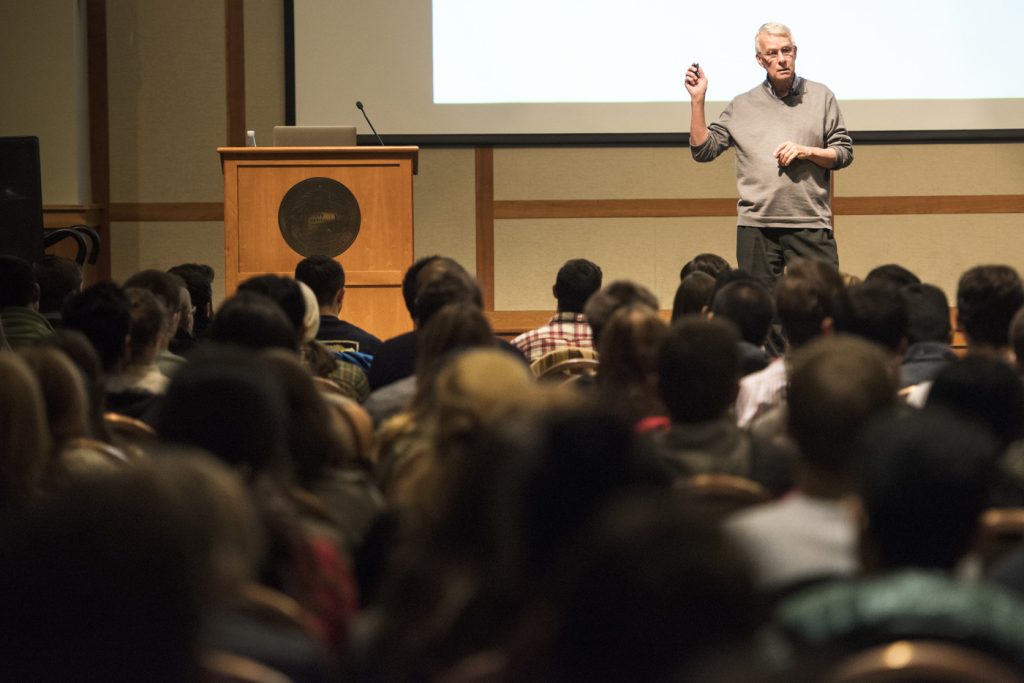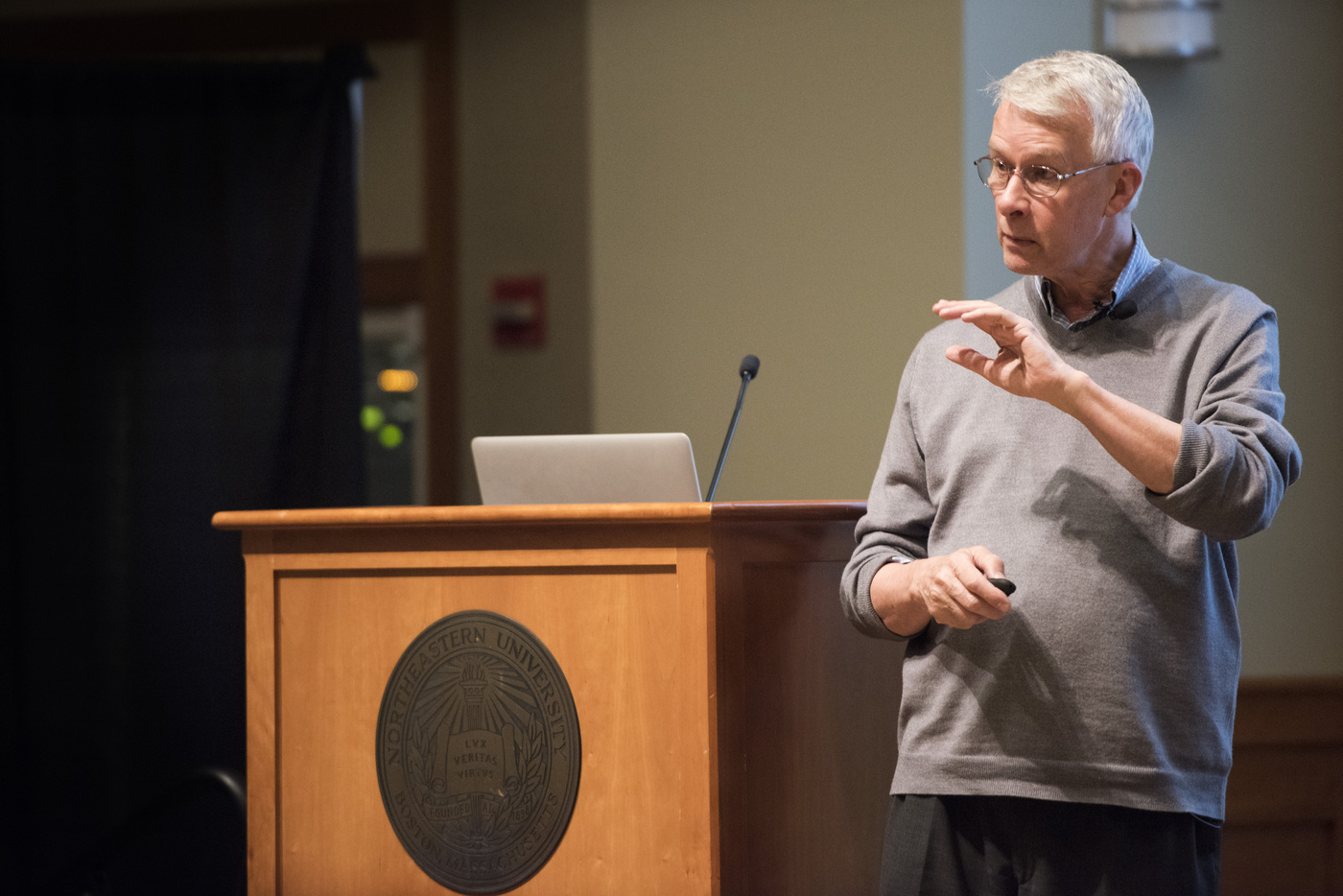by Molly Callahan
If the thought of genetically-modified organisms, or GMOs, brings to mind vague notions fraught with danger, Nobel laureate and Distinguished University Professor Sir Richard John Roberts would say you needn’t worry. In fact, he argued Thursday at Northeastern that the perceived dangers of GMOs are the result of something of a smear campaign by green parties that ultimately serve only to disenfranchise those in developing countries.
Roberts spoke to a standing-room only crowd during the latest installment of the “Beyond the Books” series, a program organized by Northeastern’s chapter of Delta Tau Delta to connect the campus community with opportunities to learn outside the classroom. Roberts and 120 other Nobel laureates have written an open letter to Greenpeace and every United Nations ambassador urging an acknowledgement that GMO technology is basically safe and should be supported for the sake of the developing world.
Here are five key takeaways from Roberts’ talk.
Genetic modification is not new
Humans have been farming for thousands of years, and it’s always been advantageous for farmers to cultivate the best, heartiest crops they can, Roberts said. Traditionally, farmers have cross-bred plant varieties with the goal of isolating, then magnifying the most desirable traits.
Take, for example, corn. If you want your corn to grow straight and produce large kernels, you’d cross-breed a variety that grows straight with a variety that produces large kernels—and keep doing that—until you get a single variety that does both.
“With this traditional way of breeding, you’re mixing two sets of DNA,” Roberts said. “You don’t exactly know what you’ve got at the end, but you can select for the things that grow the way you want them to grow. It’s considered perfectly safe because we’ve been doing this for hundreds and hundreds of years now.”
We can use precision breeding to make this process more targeted
More recently, two scientists—Marc Van Montagu and Jeff Schell—discovered a more pointed process of genetic modification that was already happening in nature.
In this process, Agrobacterium tumefaciens (a type of bacteria) attaches itself to plants and then transfers plasmid DNA, effectively “selecting a nice home for itself,” Roberts said.
Montagu and Schell wondered if you could choose which DNA was transferred through the bacteria, and their research that led to modern genetic modification in which scientists “shoot” the new gene directly into plant cells, Roberts said.
To highlight the difference between the two processes, Roberts offered an example: You want to move a GPS device from one car to another. You could take the cars apart, mix all the pieces together, put them back together, and look for the one that has the GPS device in it, or you could specifically transfer the device from one car into the other.
“When you make hybrids, you don’t really know which genes are going to and fro… Or, we can do this precision breeding in which we take the gene we do want and specifically put it into the place where we want it to go,” he said.

“How many kids have to die before we consider this a crime against humanity? How can you justify trying to stop this kind of technology?” asked Sir Richard John Roberts, Nobel laureate and Distinguished University Professor. Photo by Adam Glanzman/Northeastern University
The vilification of GMOs started as a form of protest against a perceived monopoly
Roberts posited that the seed of this idea that the more precise GMO process was inherently unsafe started, appropriately enough, as backlash against a seed company.
Europeans, wary of big agricultural companies controlling too big a piece of the food market, fought back not by boycotting those companies, but by spreading fear about their products, Roberts said. When word got out that one of the big companies utilized genetic modification, a campaign against the process began.
People in developing countries suffer the most as a result
Troublingly for Roberts, that anti-GMO campaign, spearheaded largely by green parties, has taken root in developing countries that look to the West for guidance.
After all, it’s not Europe or the U.S.—where there is not only an abundance of food but an abundant variety of food as well—that would benefit the most from targeted genetic modification; it’s the developing world—where malnutrition is rampant—that needs it most.
“Let’s take Vitamin A deficiency,” Roberts said. “In Europe, and around here, we don’t have to worry about it. Even if we’re not getting enough Vitamin A in our diets, we can take a supplement and solve the problem. In much of the developing world, however, there is a vast shortage of Vitamin A, especially in the diets of young children, and especially among those for whom rice is a major staple of their diet.”
This deficiency, he said, is the cause of death for between 1.9 and 2.7 million people per year.
Although scientists have discovered a way to put beta carotene (rich in Vitamin A) into rice grains, green party activists have put obstacles in the way of growing it, citing concerns with genetic modification, Roberts said.
“How many kids have to die before we consider this a crime against humanity?” he asked. “How can you justify trying to stop this kind of technology?”
James Condulis, S’18, a member of Delta Tau Delta who helped organize Thursday’s event, said it was this connection to the developing world that struck him most about Roberts’ presentation.
“You know, you hear about GMOs all the time, but I didn’t think about the global implications in developing countries—that’s amazing, the difference it can make in these countries,” he said.
We, as a society, have a responsibility to combat anti-GMO fearmongering
His concern for those in developing countries spurred the movement among other Nobel laureates to write the letter to Greenpeace and the U.N. member nations, Roberts said. But they can’t do it alone.
Roberts called for “civil society,” major religious leaders (he’s trying to get in touch with the Pope), and celebrities to use their platform on the global stage to extoll the benefits of GMOs and dispel the fears people may still have.
“You have a choice of what you want to eat here, but if you choose not to eat foods that are genetically modified using these techniques, don’t pretend you’re not eating them because they’re dangerous,” Roberts said. “They’re not. They’re safe.”
Originally published in news@Northeastern on October 28, 2016.

